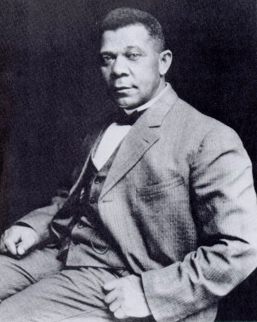Sarah LuriaAssociate Professor, Department of English |
Booker T. Washington (1856?
- 1915)
At the Shaw dedication in 1897, Washington's speech, which Lowell makes no mention of, was the clear favorite of the press. Washington was a gifted orator. Himself born into slavery, Washington's presence at the dedication must have been particularly powerful. As he mounted the stage at the dedication, the band played "Mine Eyes Have Seen the Glory." Washington's biographer Louis R. Harlan described the event: The philosopher William James spoke before Washington, stressing 'that lonely kind of valor, civic courage,' and the 'virtues which save countries from getting into civil war.' But few listened, for martial music filled the air, and the band played 'Mine eyes have seen the glory' as the black man mounted the stand. Washington gave the audience what it wanted, leaving not a dry eye in the hall when, at a strategic moment he turned to the old black soldiers on the platform, the 'scarred and shattered remanant of the 54th' who 'with empty sleeve and wanting leg' honored the occasion. At this signal the old color bearer whose flag had 'never touched the ground' arose and raised his flag high. Washington had deliberately tugged at the heart-strings, as the typed copy of his speech shows, with corrections in his hand to heighten the emotional impact and directions to himself: 'quiet' at first, 'Pause' here, 'Force' there. Washington's message was that Shaw and his men had not died in vain, that their monument was among the lowly in the South, 'in the struggles and sacrifices of a race to justify all that has been done and suffered for it.' The governor of Massachusetts led three cheers for Booker Washington. James sent a somewhat abashed letter of congratulation to Washington, saying of the occasion, 'it was the last wave of the war breaking over Boston--'the tender grace of a day that is dead' etc.' (Harlan 236)
|
 Booker
T. Washington was an educator and one of the foremost African-American
leaders of his generation. He preached the need for African-Americans
to learn skills and so be able to improve their lot. To his end he founded
the all-black Tuskegee Institute, a vocational school which trained its
students in printing, carpentry, farming, cooking, etc. Washington's "pull
yourself up by your own bootstraps" ideology was highly controversial.
While he had followers within the African-American community and won the
support of many prominent white businessmen, others, most famously, W.E.B.
DuBois, the black author and professor, criticized Washington for not stressing
the importance of intellectual training and political action.
Booker
T. Washington was an educator and one of the foremost African-American
leaders of his generation. He preached the need for African-Americans
to learn skills and so be able to improve their lot. To his end he founded
the all-black Tuskegee Institute, a vocational school which trained its
students in printing, carpentry, farming, cooking, etc. Washington's "pull
yourself up by your own bootstraps" ideology was highly controversial.
While he had followers within the African-American community and won the
support of many prominent white businessmen, others, most famously, W.E.B.
DuBois, the black author and professor, criticized Washington for not stressing
the importance of intellectual training and political action.